Audio and Video Copyright © 2018 The Foundation for Apologetic Information and Research, Inc. Any reproduction or transcription of this material without prior express written permission is prohibited.

August 2018
A year ago, I guess it was two and a half, three years ago when I was speaking at Fair[Mormon conference], I felt really strongly about the opportunity to take off my hat, because I was on chemo and I was bald, and it was so hot up here that I took off my hat. And I got chemo curl back, but the main question I received when I talked about Christ’s emancipation of women was, well then, what happened to the epistles? You know, what happened to Peter and Paul? And so I’ve come back to try to answer that question,a little bit later than I had hoped, but I am here now to do it.
The first thing I want to make sure that everyone does is take one minute and tell the person next to you, where on the spectrum of misogyny do you place Peter and Paul? Tell the person next to you. Because I hope to change that perspective somewhat by the end of the talk.
Because Christ planted the seeds of mutuality in marriage and of empowering women and children and the underling, I feel that not every seed was found on good soil, but I will argue that when it comes to Peter and Paul, this is a hot topic, and I claim, my thesis is, that even though we see a radical difference between the culture of the Greco-Roman world and Christianity, the majority of the New Testament, including the epistles of Peter and Paul, follow Christ’s teachings. And I feel really strongly about this.
But to start out with, in case you forget all the little details, when you come across a topic perhaps that I don’t address, whether it’s in church history or in Biblical studies, go through these questions and ask yourself:
- Did the author really mean this?
- Was this a specific problem?
- Is this message consistent with scripture?
- What do other translations say?
- Did Joseph change this is his translation?
- What was the question that brought out the answer?
- Is this in harmony with the restored gospel?
So just in case you ever come across a questionable text in your future reading, make sure that as a good scholar, you don’t throw the baby out with the bathwater, and you look a little bit deeper.
But the apostolic church, I’m convinced, is really given a bad rap on this.
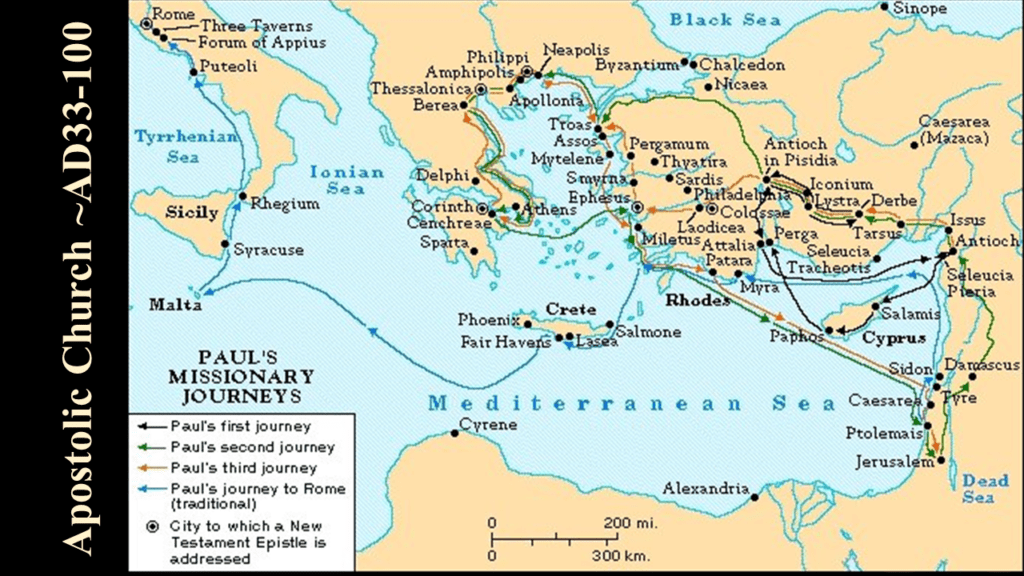
First of all, who wrote the gospels? The apostolic church. I mean, it’s Matthew, Mark, Luke and John, or whoever their groups of schooling are, you know that’s a very debated talk, but the bottom line is, everything in the gospels came out of the apostolic church.
The whole reason why we know the women in the gospels– Mary Magdalene, Salome, Joanna– is because people from the apostolic church knew their names and wanted their story told.
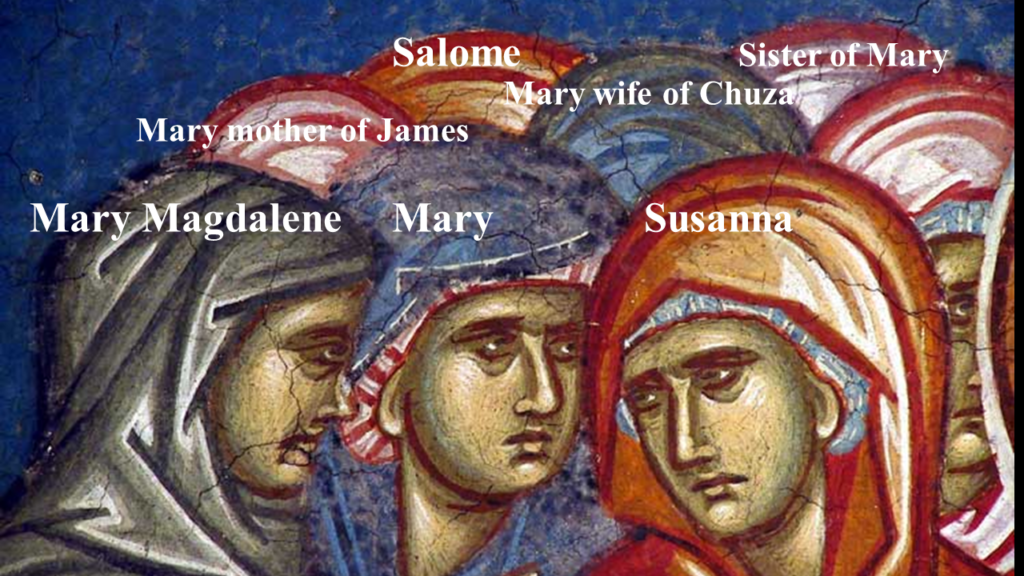
It’s the apostolic church that has Luke writing next to every single male story, a female story. Which, by the way, is more than we get in the church history lecture we just heard about. In fact, there are so many women mentioned in the New Testament, 180 references to women, which is even more than Daughters of My Kingdom, I noticed as I was listening! But of these [45 named, 94 unnamed, 14 fictional] 45 named women, we get over 30 of them are positive female disciples. This is fabulous! [45] that are named, but we have many, many more that are unnamed. And half of those that are named are included in the Epistles, not in the Gospels.
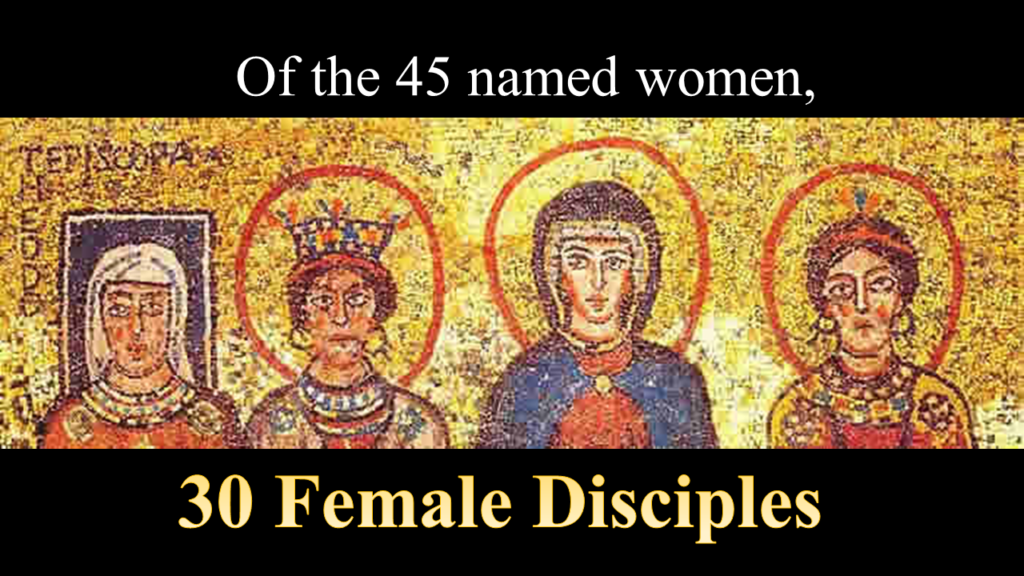
But I stand to say, who wrote the stories of Jesus? And who decided to include the Syro-Phoenician who says, “The dogs eat the crumbs”? And who decided to include the woman touching the coat? And who decided to include the longest conversation that Jesus made with the woman at the well. Who decided to include those? It’s the apostolic church. So before we throw rocks at Peter and Paul, let’s go back and look at B.H.Roberts’ listing of the women. I mean, let’s just give Peter and Paul a break. You know, they come from on the other side of the Hindu spectrum of how they feel about women, coming from the Greco-Roman world. So I’m really glad I got to follow instead of precede the last lecture, that was just perfect.
In addition to having their names mentioned in the epistles, we also have these wonderful titles that I think Paul included, that we need to review: Mother, co-worker, witness, disciple, servant, church worker, sister, deaconess, wife, yokefellow, and one “prominent among the apostles” (Romans 16:7, ISV). These are names of people who have leadership positions, who are great women of faith, and yet we often remember the three or four statements, and throw mud on their faces as if they were misogynists. And perhaps there are some statements that we need to address. But as a general rule, I feel that the New Testament, and specifically the apostolic church, shows women in the light of great faith, of doing great works, and more than the men, following the examples of Christ as being the servant of all.
I feel the stories of the women in the New Testament, show them following the example of Christ, who says repeatedly, over and over, “I have not come to be served, but to serve, the greatest will be the least, I am the servant among you,” and we see the women following that role.
So let’s start with the epistles. And I like starting with the Book of Acts, written by Luke, because he does such a great job of telling us about some of these house churches. There are no buildings, just like upstate New York Burned-Over District, and Kirtland, and Missouri, and Nauvoo; there are no ward buildings, they’re meeting in people’s homes, and these house churches are being run by women. And we have the names of the women, at least four that are mentioned in the epistles and Acts.

Mary, the mother of John Mark: so this is a woman who is in Jerusalem. Do you remember after Christ has been crucified and the apostles and the people are all gathered in her home when the women come with the news that the tomb is empty and that angels have told them that he has been resurrected? They’re staying at John Mark’s mother’s home, and then John Mark is the scribe of Peter, who then writes Peter’s gospel, which is called the Gospel of Mark, because he’s the scribe. But that’s John Mark, that’s the man that we’re talking about. That’s his mom who is wealthy and in Jerusalem.
And then we have Lydia, the seller of purple.
Chloe, now Chloe’s an interesting one. I really find this fascinating. Because the whole book of 1 Corinthians is a big, long spanking. Everything he addresses is a spanking. You know, he’s just telling them, “You’re doing this wrong, you’re doing this wrong, you’re doing this wrong.” And then the second epistle is “Oh, I’m so proud of you. Thank you, thank you, thank you, oh yes.” But this first epistle is hard, and what does he do? He says, “Okay, I’ve gotten all this information from Chloe. And she told me how bad you are. And I’m going to address every single point that she addresses here.” So not only is she put on the spot, but she is put as a position of “I trust her judgement, I trust her observations, and I am going to hold her up, so that you can respect my sources as well.” I think that’s a pretty difficult position to be in, but I still admire her, because he speaks so highly of her repeatedly in his letter of 1 Corinthians.
And then the last one is Priscilla and Aquila, our husband and wife tentmakers, the ones that Paul who is also a tentmaker and gets to live with them when he’s on his second mission in Corinth for 18 months as he makes tents there.
We get so many other great stories in the apostolic church of these women of faith. I’m sure you remember some of their names if you don’t remember their stories: Tabitha, Eunice and Lois, Phebe, Junia.
But in addition to these beautiful named women, the 111 unnamed women have major roles in the church. So just because the schools that are compiling or editing the gospels at this time are unfamiliar with some of these people, their stories stand out as bright, shining women of faith and commitment, and I really admire them.
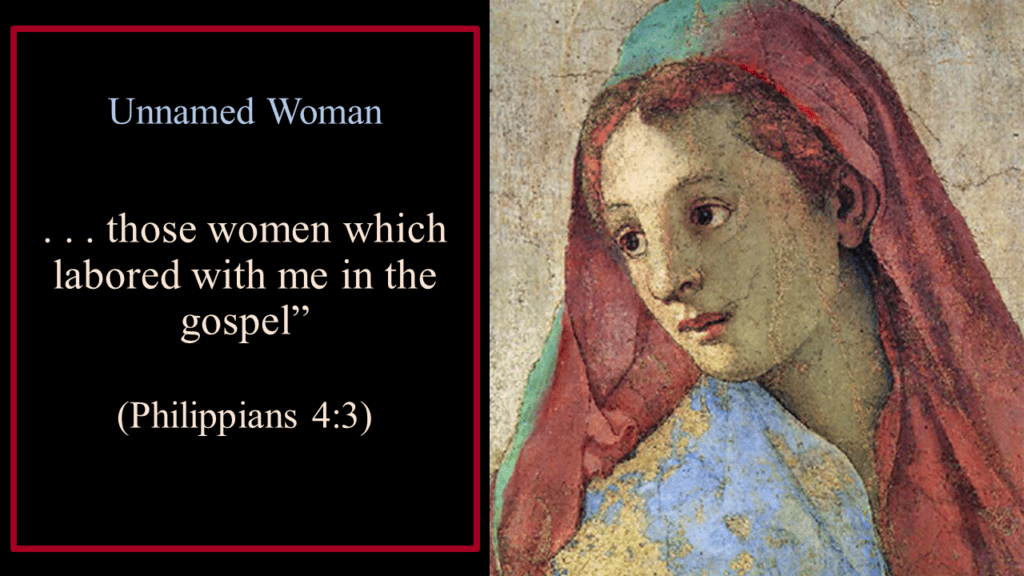
Some of them in particular that you may not know well from the epistles of Paul include these wonderful women of Philippi who labored with Paul. These are not women who are just on the sidelines, serving the meals, but they are missionaries, and they are working with him, and they are making decisions. We see this wonderful role of his wife as he calls her the yokefellow in this epistle. Galatians also refers to his wife in very positive terms. And in the later epistles we know that he refers to being a widower or a single man at that time when he’s serving his mission, when you read about this in Timothy.
But another one that I just love is Phillip’s “…four daughters, virgins, which did prophesy” (Acts 21:8-9). And remember, in the Book of Revelation, John the Beloved defines prophecy as one who has a testimony and can testify with a surety of Jesus Christ. And Joseph Smith chose to use that definition as well when he defended himself in Springfield, Illinois, at a court of law when they said, “Are you a prophet?” and he said, “I am a prophet as according to the Book of Revelation, as John the Beloved described it.”
We also get this beautiful description: Now about the gifts of the Spirit, “…brothers and sisters, earnestly seek these gifts”” [‘…eagerly desire gifts of the Spirit, especially prophecy’ (1 Cor 12:1-14: 1, NIV)]. A lot of the times, part of the challenge of the New Testament of course, is we were raised in a generation and in a century and in a millennium where “man” was “mankind” and now we have to be a little more careful and say “humanity.” But so much of the King James version, when it says “he” or “man,” if you look at the Greek, it’s actually multiple genders. It’s plural, and this is one of those situations. The gifts of the Spirit, when Paul is encouraging the saints of any age, of any gender, of any class, and he repeatedly delineates, “I don’t care black, white, male, female, free, slave, all are alike unto God.” And Paul, I think, does a good job of that.
Okay, now I’ve defended him enough. You want to get to the meat, so here it is. There are some challenging verses. In fact, there’s three major problems. And I think the three major problems stem over our definition of three major words, but I’m going to give you examples from this spouse subjugation, this dress and hair thing (which just made me smile the whole way through the discussion of this, sorry), and then the issue of silence in church.
But I really feel it’s these three words that are used regularly can be summed down into three or four examples. So even though I’m only giving you four examples, there’s probably eight tricky, maybe seven tricky issues in Paul and Peter. There are dozens of positive examples, but of course you only remember the sore thumb.
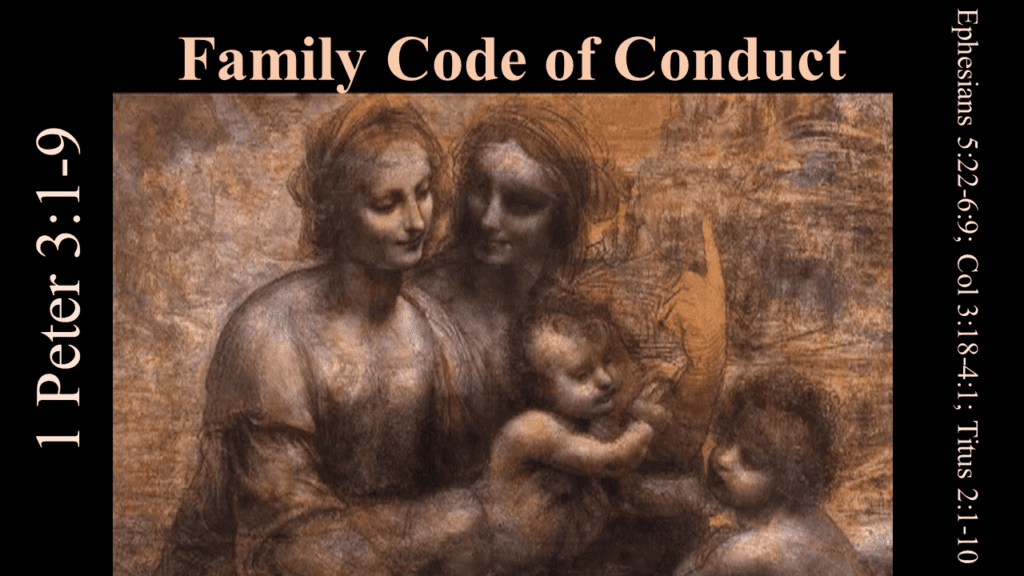
Four times in the Epistles, we get this family code of conduct. Three in Paul, and one in Peter. And by Paul, I’m referring to the traditional Pauline epistles, not to the ones that scholars now debate (you know, the Pastorals Timothy, Timothy, Titus they don’t think were written by Paul) but I’m just using the traditional verbage to say these words are used, and this family code of conduct is there.
And this is where, if you’re a young mom, you’ve got to start teaching your kids. The first scripture all my kids had to memorize, Ephesians 6:1, “Children, obey your parents in the Lord, for this is right.” And this is where that’s listed. And they have sections where masters are to report, and how slaves are to act, and how husbands and wives are acting.
But I want to focus in just on the part about the marriages in this code of conduct. And I’m going to focus on Peter’s, even though Paul uses very similar wording and similar ideas; I think if we can just understand one of them, you can make the connection to the other. So I will focus on Peter’s understanding here.

So remember, there’s no chapters, there’s no verses, it’s just a long letter. And the sentence before the section on marriage, in Peter, he gives this beautiful example in church. And he says, “Christ… [left] an example, that you should follow in his steps. ‘He committed no sin, and no deceit was found in his mouth.’ When they hurled their insults at him, he did not retaliate; when he suffered, he made no threats. Instead, he entrusted himself to him who judges justly…now you have returned to the Shepherd and Overseer of your souls” (NIV, 1 Peter 2:21-25).
And the very next word is, “In like manner…” and he goes on (depending on the translation, I’m sorry, I obviously wasn’t quoting King James, likewise in King James), and then he addresses the need for the wives to work together and cooperate in their family relationships. And the real problem here, as you can read in some of these different translations [KJV, NEB, Welch-Hall], is that we are having a lot of people converting to Christianity, but their spouse has not. And since this is a general letter from Peter, it can be anywhere from Israel all the way to, you know, the church is going from India to, there’s certain examples of Christianity that expanded far beyond Rome to the West by the time the apostolic church ended.
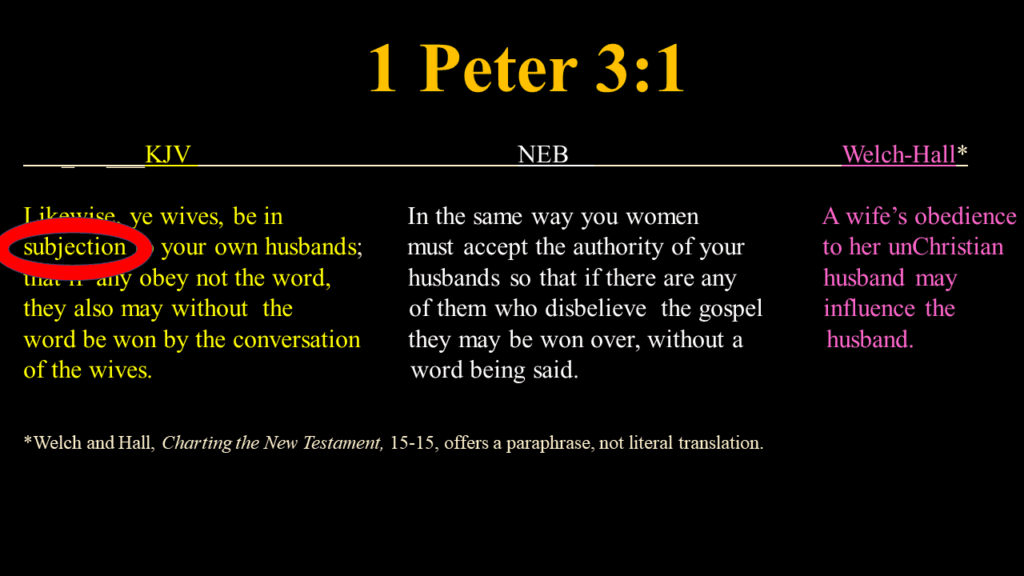
So he’s saying, if you have one spouse who is believing and the other spouse isn’t, you guys still have to cooperate, you’ve got to work something out. But we have in this section this word [“subjection”] that is a little bit offensive to an American audience, or perhaps to some Americans in an audience, or perhaps some Westerners in an audience. I think we’ve sort of swung the pendulum so far on individual rights that we forget that sometimes submitting and cooperating and mutuality and mediating are good things.
But because this is a little bit tricky, I want to specifically address this word. And we find that Peter uses it six times in this one letter. I’m going to read a couple of them, because they’re fabulous.
“Submit yourself to every ordinance” (1 Peter 2:13, 18).
“Likewise, ye younger, submit yourselves unto the elder. Yea, all of you be subject one to another, and be clothed with humility: for God resisteth the proud, and giveth grace to the humble” (1 Peter 5:5).
If we continue looking beyond, into the other epistles, Paul uses this Greek word [“hupotasso”] over 40 times in the New Testament. So this is a very well-known word that King James often translates as “submission”, “subject”,” subjugation”, whatever. So it goes back to this old military word which means “to arrange in a military fashion under the commander or leader.” And the word was so common in the military that it began to have a non-military meaning. And in the non-military meaning, it was “a voluntary attitude of giving in, cooperating, assuming responsibility, and carrying a burden.”
So if we take these two definitions, both the military and the other, we get a different translation of this. This requirement was absolutely radical, to give in, to cooperate, to work together. And Paul uses it both for the men and the women. This is completely unknown. This is written by a non-Latter-day Saint, excellent Biblical scholar on the topic. He said, [“This requirement was the new, radical idea that Christian husbands also were to love and submit to their wives rather than control them” (Parales, Hidden Voices: Biblical Woman, 132)] we just don’t appreciate how radical this idea is, that the Christian husbands were supposed to love and submit to their wives, [rather than] control them was absolutely ridiculous in the Greco-Roman world.
And if you take the same word and you put it in the code of family behind Paul’s work, it says, “The wife stands behind her husband in all things when her husband stands behind Christ” (Ephesians 5:22-24, Welch-Hall) if we’re using the military definition.
And if we’re using the non-military definition, “A wife cooperates and assumes responsibility with her husband to carry their burden with Christ.” Very different meaning, I think, to an American, 21st century woman.
I don’t feel that Paul or Peter were trying to say anything misogynist in saying, “You guys, let’s submit to each other.” I think they’re saying, “Let’s cooperate, let’s share this load, and let’s work together.”
I think it’s very consistent from what we hear from our Latter-day Saint leaders. A husband and a wife’s “…stewardships, equally sacred and important, do not involve any false ideas about domination or subordination” (Ensign, Mar. 2006, 29-30). And you guys, look at that year, that’s 2006, that’s before he [President Russell M. Nelson] marries Aunt Wendy. So you just think what he feels about that topic now.
Elder Packer: “In the church there is a distinct line of authority…. In the home it is a partnership with husband and wife equally yoked together, sharing in decisions, always working together” (Boyd K. Packer, “The Relief Society,” General Conference, April 1998, 73).
Elder Perry: “In marriage there is not a president and vice president. The couple works together….They are on equal footing” (Ensign, May 2004, 71).
And these are duplicated by hundreds more that you can find if you just open up your gospel app, but returning back to the epistle of Peter: [1 Peter 3:2 “While they behold your chaste conversation coupled with fear” (KJV)] Another King James word that’s a little bit tricky here is “conversation.” It really means your way of life, or your behavior. And so he’s saying, the non-believing spouse, whether it be husband or wife, once they see your way of life, you’re living the gospel fully, they’re going to respect you more. So if you just come to a cooperation, you’ll find a little more harmony.
He then gives, for two verses, the example of Abraham and Sarah. And he says, “…you are her [Sarah’s] daughters if you do what is right and do not give way to fear” (1 Peter 3:6, NIV). Now this to me is extremely important. Because the average Greco-Roman had five divorces; the average Greco-Roman woman and man had 4-5 divorces each. In the Judaic world it was less only because the women lived in total fear. Your husband could divorce you for burning your toast. Your husband could divorce you for leaving a mess. If your voice is heard in the next room, your husband can divorce you, and you don’t get the bride price. The list is over 150 pages long in the Mishnah of how he could divorce you. And it has to be three words: I divorce you, I divorce you, I divorce you, and in front of a witness and it’s done. And if he writes it on the hand of a slave, you get the slave. So ladies, there’s some good out of it. And if he writes it on the horn of a cow, you get the cow. So there was some good that came out of it.
But the crazy thing is here, the epistles are repeatedly saying, “We do not want the women living in fear.” And go back to the gospels. So many times Christ says—to the woman who’s touching him after twelve years of bleeding and she’s so scared because he’s calling her out in public and he says, do you remember? “Go in peace.” And so many of the other times, he says, “It’s your faith that saved you. And I want you to not fear.”
And the apostles do the same thing. Here’s other translations: (1 Peter 3:6) “…fear no intimidation” (NAB) “…let nothing terrify you” (RSV) “…or worry” (JB). Or don’t worry about this. Don’t let your anxiety get hold of you here, women.
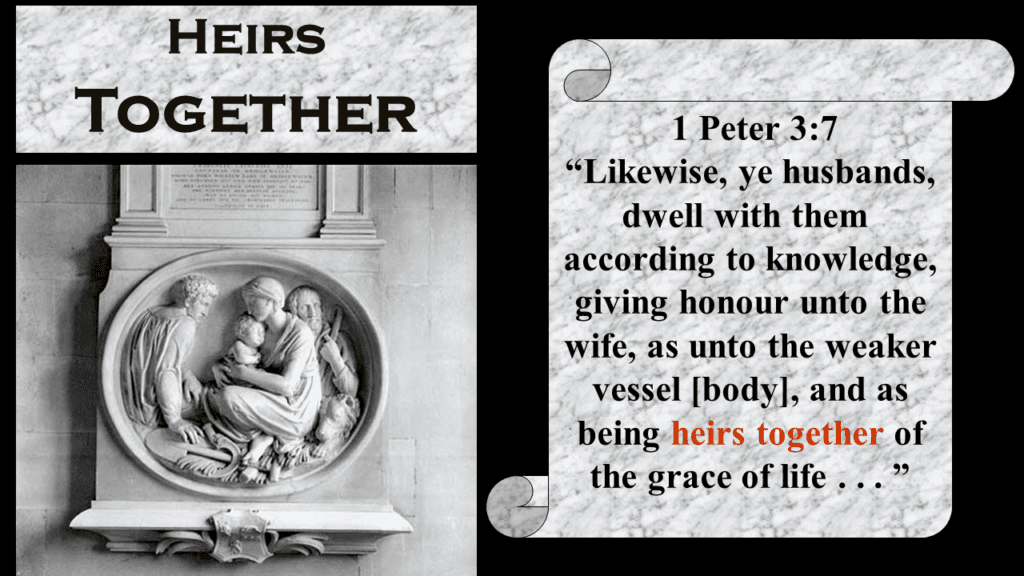
And then Peter ends with this marvelous promise, as well as the statement that a woman’s body is less strong than a man’s, generally speaking. But he’s not talking about the physiology. He’s just saying a weaker vessel, but he’s not talking about physiology. What he wants to emphasize is: [1 Peter 3:7 “Likewise, ye husbands, dwell with them according to knowledge, giving honour unto the wife, as unto the weaker vessel [body], and as being heirs together of the grace of life…”] “Husbands, dwell with your spouse according to the gospel knowledge. This knowledge that you have, I want you to honor the wife, because you will be heirs together in the grace of life.”
And we have multiple verses in the New Testament that refer to celestial marriages [1 Peter 3:7; 2 Peter 1:10; Romans 8:17; Titus 3:7; D&C 132:19], that the Holy Spirit of Promise has sealed you together eternally, that you will be heirs together. And I feel like this is extremely critical in understanding ideas on Peter and Paul and women, is that they have this doctrine.
And then Peter ends with a warning. He says, “If you are not communicating well with your wife, you are not going to be able to communicate well with God. Your prayers are going to be hindered. [1 Peter 3:7 “that your prayers be not hindered.”] And you guys, this is almost word for word against one of the rabbis from this era who used to say, “Talk not much with womankind.” He said this of his own wife, let alone another man’s wife. And another one says, “He who speaks to women is taking his time away from studying the law, hence he will inherit Gehenna” which is hell. So they feel very strongly that speaking to women and spending time with women, in the Judaic culture of the Pharisaic school of thought, which is the ones who won, so that’s all the records we have, because they won after the destruction of Jerusalem in 70 A.D., their doctrines say it’s better not to communicate with women.
And we have the exact opposite with Peter. He’s saying, “If you’re not talking to your wife and you’re not working things out, God’s not going to hear you. You’ve got to have harmony in the home and unity in the couple.” This is extremely radical doctrine.
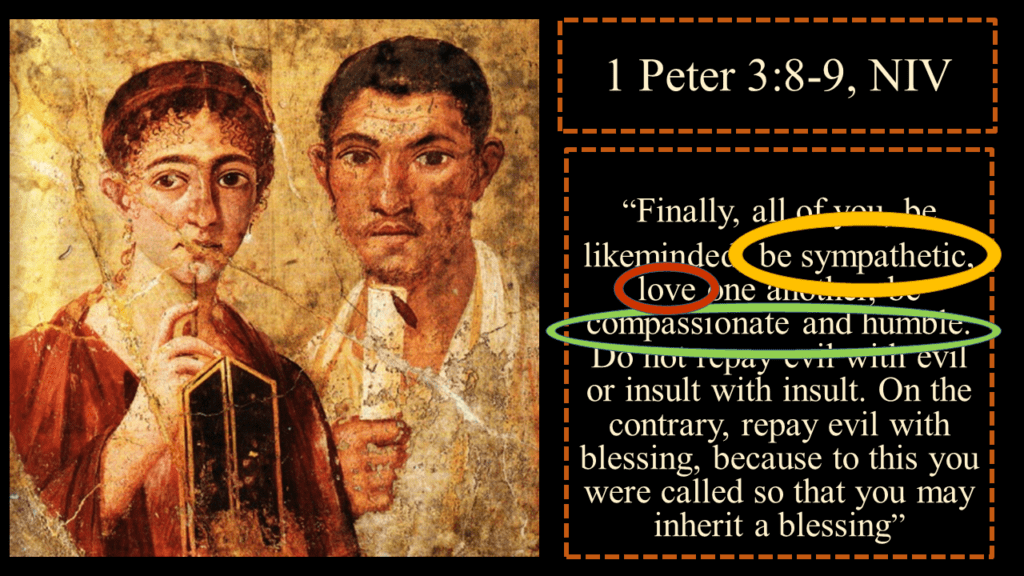
“Finally, all of you, be like-minded, be sympathetic, love one another, be compassionate and humble. Do not repay evil with evil or insult with insult. On the contrary, repay evil with blessing, because to this you were called so that you may inherit a blessing” (1 Peter 3:8-9, NIV).
I hope that I have emphasized that the message of Peter, repeatedly, even if we do find a couple of words that stick out like sore thumbs, is very harmonious. We are no longer living the Mosaic law of an eye for an eye. Instead, we want to return good for evil and kindness for cruelty and forgiveness for pain. That is how I feel about the misogynist statements in Peter, that he really did try to follow the Savior. He’s a mortal, he’s the one who falls into the water and can’t walk on it for very long without the Lord’s hand. But like all of us, let’s not throw stones.
Now, of course, we come to the harder ones. And I may not be so able to convince you on this one, or on these. But I love Paul. I tried to name three boys Paul and my husband wouldn’t let me because there’s six Pauls already in his family.
But let’s first of all remember that the epistles are one-sided. We do not know the whole story. We know that the letter to the Corinthians is much, much later. Because he refers in this first letter that we have to other letters that “I’ve already been writing you on the subject”. So let’s just remember there’s ongoing problems. And the reason why there’s ongoing problems is because Corinth is a double-port city.
When the Greeks cut through that 4-kilometer space of solid rock in order to make a canal so that the boats wouldn’t have to go around the treacherous sailing waters in the winter, they could just cut through, it became a double-port city. And like most port cities, it became doubly promiscuous. And the word Corinthianize means to live a desolate life. If you’re a Corinthian man, you’re a whoremonger. If you’re a Corinthian girl, you’re a prostitute. If you Corinthianized, you had sex, illegitimately. And in the center of Corinth is this beautiful temple to Venus and they employed one thousand women prostitutes to act as priestesses to the goddess there.
So promiscuity is a real problem here. And all of Paul’s letters on marriage and sexuality are trying to combat this culture. And he was there for eighteen months during his second mission, he knows these people well, he addresses them by name. And he talks about two things that are a little bit difficult in this letter for us. One is the dress of the women, and the other is the silence in the churches. So I want to address those in this context.
A man at this time—okay, we have an artist in the room. And I hope the rest of you artists will understand this. Men at that time went out bare-headed. Whoever does the temple movies can tell them this too. Men went out bare-headed while the woman went out with her head covered. [Genesis Rabbi 17.8] And it wasn’t just her head, it’s the whole body, it’s head to toe. And we have lots and lots of examples, you know, hundreds of examples to explain that women went out that way. In the Pharisaic Jewish tradition, the women wore these headbands.

[Women wore “two head veils, a head-band on the forehead with bands to the chin, and a hairnet with ribbons and knots, so that her features could not be recognized” (Jeremias, Jerusalem, 359).]
This is a bad picture, but I couldn’t find one, I didn’t know how to do, I should have given it to one of my kids to shop, what do they do, photoshop in all the [inaudible] on her face, but they covered their whole countenance here, they could not be identified, their children could only identify them by their hands.
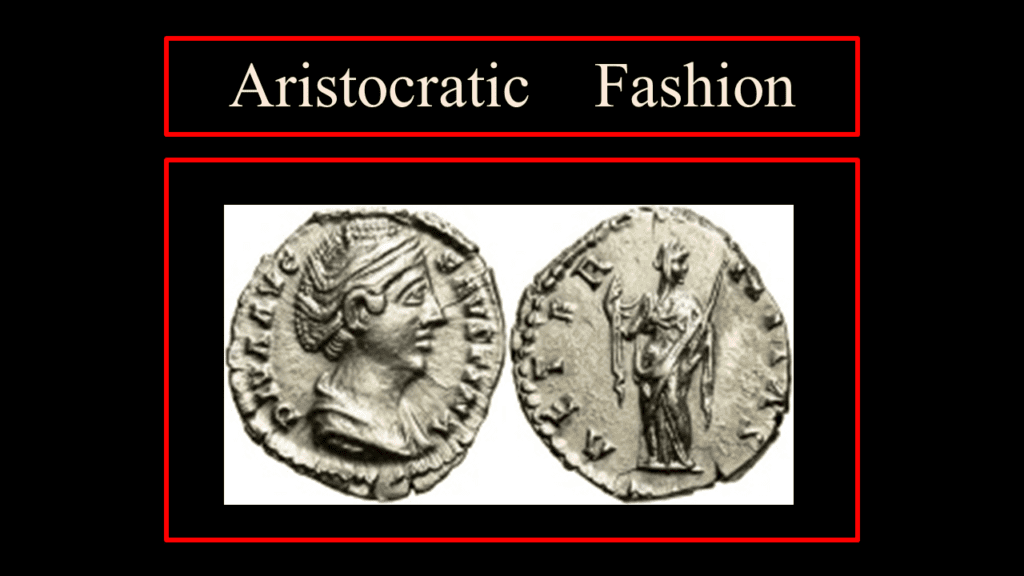

But in the Greco-Roman world, which is the majority of the Christians in Corinth, it’s a fashion. And you look at the coins, and you see these emperor’s wives, with these lovely things for strolling across their heads and down, and it’s a fashion statement. You see it on carved tombs. And it’s nothing demeaning or subjugation, it’s a beautiful thing that they would wear. If you look at the other neighboring traditions, if you look at the Assyrian empire, the middle Assyrian empire, it was a status symbol, actually, because the women who had it were the real wives. And if you were a concubine or a mistress, you didn’t get to wear the veil. The veil sets you apart as the Brahman, as it were. So it gave you status and culture there.
It was also used in religious cults. This is a cult that came up from Egypt, so it’s illegal. There’s only ten religions that were allowed in the Greco-Roman world in the late second temple period of the New Testament. And of those ten, one of them was Judaism. But Isis was not. Isis came up from Egypt, and it was a cult where the women acted as a priestess, and they covered their heads when they came to the altar. And it was called Isis, unfortunately, but some of our favorite words are changed nowadays.
But it meant something very different to all these Christian converts. So the idea that Paul wants to address, veils and women veiling during prayer, especially during prayers that have to do with special ordinances where they’re also prophesying or testifying of Christ, was very difficult, because the veil has a different meaning with all these different cultures.
And so Paul does not talk about subjugation, he is not talking about fashion, he is talking about a Christian veil. And instead of reiterating the restriction, he chooses to talk about the theology. And he wants to say that a Christian veil will empower the women.
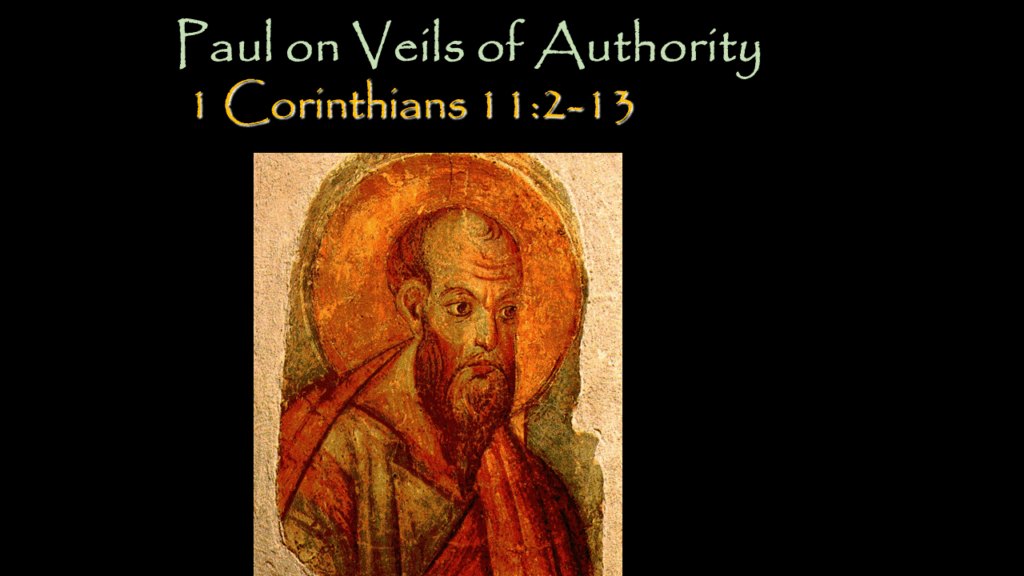
He starts out in chapter 11, verse 2, to give you a little context, I say, “…keep the ordinances, as I delivered them to you….I have received of the Lord that which also I delivered unto you” (1 Corinthians 11:2). [ordinances = paradosis: to hand over, transmit, deliver, yield up; 1 Cor 15:1; 2 Thes 2:15; 3:6; Gal 1:14; Col 2:8; Mark 7:5]. Now this word is not translated as ordinances in any other modern English translation. And the reason why not is because it is a very broad definition. It means teachings, it means doctrines, it means something to hand over. So I wanted to look specifically at how Paul used this word.
I can go to my Greek lexicon and I can read a whole string of words as to what this means. But how does Paul use this word? And in the book of Corinthians, he uses it specifically for those things that he received from Christ that he hands over. And he repeatedly talks about things that are ordinances in the light of baptism and sacrament and then this prayer circle, that he doesn’t refer to by the name of prayer circle, he just refers to it as the sacred time where women are joining with the men, and they veil their faces and they pray together. And they prophesy.
Joseph Smith did teach that “Paul… knew… all the ordinances, and blessings [that] were in the Church” (Ehat and Cook: Words of Joseph Smith, 10; also 9, 42, 110, 210, 327-331). This is from one of his Nauvoo sermons.
Every time Paul uses this next phrase in the epistle to the Corinthians, when he says, “But I would have you know” (1 Corinthians 11:3) it’s just like when you tell your children, “you did a nice job cleaning your bedroom, but…” So this is the same thing, “thank you for keeping the ordinances, but…” You know something is a problem here. And every time he uses it, he gives them another spanking.
And he refers to this word kephale. And before I go into the text, I want to give you the Greek definition, so that you don’t fall into the trap, we can go a little bit faster by keeping your mind on top of this. Kephale is used regularly in Paul, and he uses it for your “head” or your “source.” Interestingly, in English, we have the headwaters of the Nile, and the head where your cerebellum is intact. And you do the same thing in Greek and in Hebrew, and they’re both the origin and the source as well as this physical thing up here. And Paul uses a different word when he wants to talk about a chief or a ruler.
In verse 3 (1 Cor. 11:3), Paul says there’s this order. And that God is the head of Christ, which is the head of man, which is the head of woman. And it is often understood by this that they are the ruler or the chief of, but I would like to suggest that that is not how Paul is using the word, that the context of this section, and by the context of his letter, there’s enough evidence to say Paul is taking us back to Eden. He gives four or five examples from Eden as he’s talking about this ordinance of covering your heads. For some reason, he wants to get them back to the Garden of Eden as he tells this story.
And the first thing he says is, “Every man praying or prophesying, having his head covered, dishonoureth his head” [head = kephale = source, origin] (1 Cor. 11:4). So if we use this literally, he’s dishonoring his head, who is God, because God says, in Genesis, that he’s going to create man and woman after his image, “after the image of God created he them, male and female…” as you know. So if a man is covering his face, he is dishonoring he who he is created after, which is our Savior, or Jehovah.
But then Paul goes onto verse 5 that says it’s different for women: “…every woman that prayeth or prophesieth…” (1 Cor. 11:5) – the reason why I stopped the slide right there is because I want you to remember what he just said. What did he say? Are women supposed to pray? Are women supposed to be prophesying? Now, you’ll need to remember this verse when he we get to the hard one, when he says “silence in church.” Remember this one. This is one of those twenty that I said he says women can talk and preach and prophesy, versus the one that says they can’t.
So then he says, I want you to be doing this, [prophecy/propheteuo – to speak forth under inspiration] I want you to speak forth under inspiration, or with testimony, I want you to be doing this, and “every woman that prayeth and prophesieth with her head [physically] uncovered dishonoureth her Head” (1 Cor. 11:5)
So why is it different? Why is our “source” different? Well, it’s different according to Paul’s theology because Adam, or the male, is representing the glory of God [“…he is the image and glory of God”(1 Cor. 11:7)], and the female is representing the glory of man [“…the woman is the glory of the man” (1 Cor. 11:7)].
And the glory of man, I think, is easier understood by Latter-day Saints when we go back to Moses 1:39, “This is my work and my glory, to bring to pass the immortality and eternal life of man.” So the next generation, the woman then becomes a co-creator with God, and she then becomes the source of the next generation. And the next generation is God’s glory, but it’s also, she is the source of it, so she becomes the glory of man. So in order to humbly stand before God, she needs to have her head covered.
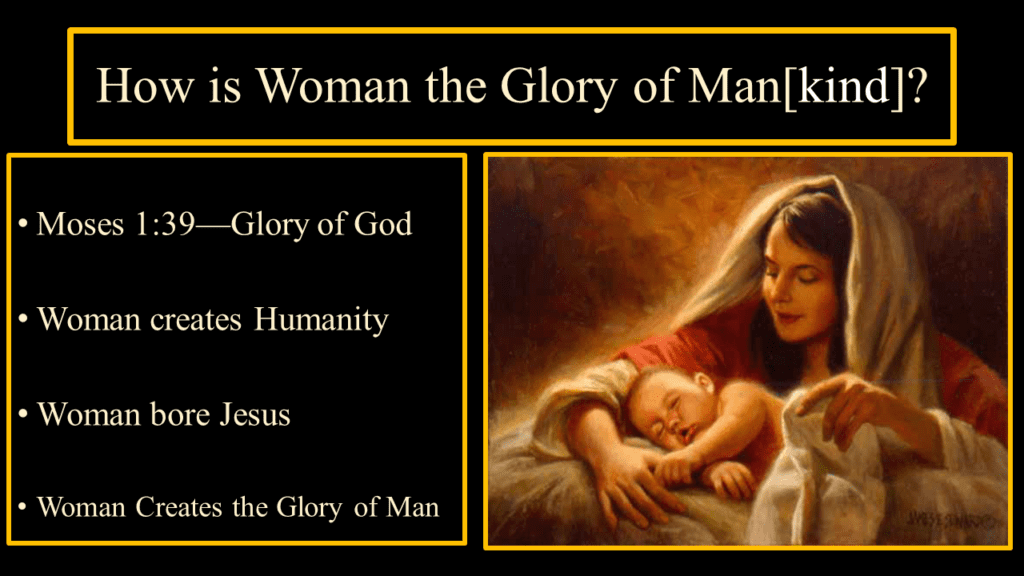
Another reason why woman is the glory of man is because she is the mother of our Savior. Another translation of this, then, would be that woman representing humanity’s or mankind’s glory, veils humbly before God.
And then he goes on to say there’s another reason why she has to wear the veil. She has to wear the veil because it gives power on her head and because of the angels. [“For this cause ought the woman to have power on her head because of the angels” (1 Cor. 11:10)]
Now this word “power” is interesting because it’s more accurately translated in the NIV as “authority” [“…a woman ought to have a sign of authority on her head because of the angels” (NIV)]. In order to function in the ordinances with men, she needs authority to be there. And so she needs to have her head covered as a symbol of her authority.
So the veil, Paul says, is not the Judaic or the ancient ideas, it is one that should empower us. It gives us humility before God that we can stand before our Savior, we can stand before him in his presence, and we have authority to do such.
And then he goes back to the Garden of Eden again, and he says the angels are the ones who the woman needs to have this sign of authority to pass by. The angels of course were at this creative time, and it is the angels then who have this form of ministering to these women when they are acting in the ordinances.
Joseph Smith, out of this whole chapter, changed one word. And that was the word of the veil [“…have a covering on her head because of the angels” (JST, 1 Cor. 11:10)]. Instead of saying the woman has power on her head, he said he wants them to be covered. He has this covering on their head because of the angels.
And I think it’s significant – not that Joseph understood it in 1831 when he’s doing this, or 1832 – I think it’s significant that the word “covering” is the word “atone” in Hebrew, the kathar, that we have to have the atonement on us, from the time of Eve, in order to have authority and power to return, to enter into his presence, to partake again of the Tree of Life, and to enter into his presence without our sins.
And then he comes to this very empowering grand finale, think of fireworks going off in your mind: “Neither is the man without the woman neither the woman without the man, in the Lord.” And this was quoted earlier today as a positive source from Paul. I feel his doctrine is clearly consistent with the idea of checks and balances, that the husband and wife have to check in with each other only as they are in line with God.
And then he ends with: “For as the woman is of the man, even so is the man also by the woman; but all things of God” (1 Cor. 11:12) – remember the word “but” is also “and” in the ancient world, it’s just they don’t have commas and periods so you put “but” or “and” in—
So Eve is from the rib, and in the next generation, the man is from the woman. There is complete interdependency between the genders in Paul’s grand finale. And this idea, I feel, is absolutely empowering. And whether or not we understand it as we veil to pray, I feel that the theology that Paul sent out was meant to give women equal status as they represent humanity, and as their womb becomes the veil.
A couple of chapters later [1 Cor. 14:31-35], you’d think these verses never existed. But in between these two chapters [1 Cor. 12-14], we get the Gifts of the Spirit where he says, “Women, I don’t want you just prophesying and praying, I want you having visions, I want you healing, I want you having powerful impact on Christianity.”
And it’s for both genders. And Joseph Smith looks at this area and changes it to “they” [KJV = “he”, JST = “they” (1 Cor. 14:3)] when it says the Gifts of the Spirit are to be one gender. Joseph changes it to plural.
And in this one letter, five times [1 Cor. 11:5, 12:7-11, 14:3-4, 24, 31] Paul refers to women preaching and worshiping in the church. If you look at all the Pauline epistles as well as Acts, you have twelve times [Rom. 12:7, 16:1-2, 1 Cor. 12:28-29, Gal. 3:28, 6:5-6, Eph. 4:8, 4:11, 29, Philip 4:2-3, 2 Tim. 2:2, Titus 2:3-4, Acts 18:26] where he specifically says women are to speak out and preach in church.
However, we come to this troubling passage. This is so interesting [“For ye may all prophesy one by one, that all may learn, and all may be comforted” (1 Cor. 14:31)].
Verse 31. “I want everybody taking their turns, but I do want everybody. I want all to prophesy. Just do it one by one. I want everyone to be able to learn, I don’t want confusion here. Let’s all take turns.”
And then he says, “And the spirits of the prophets are subject to the prophets. For God is not the author of confusion, but of peace, as in all churches of the saints” (1 Cor. 14:31). So you get the idea that there is something going on with irreverence. You get the idea he’s been to my Palo Alto 1st Ward.
And then comes the difficult verses: “Let your women keep silence in the churches: for it is not permitted unto them to speak; but they are commanded to be under obedience, as also saith the law. And if they will learn any thing, let them ask their husbands at home: for it is a shame for women to speak in the church” (1 Cor. 14:34-35). And this, to learn anything, go home and ask their husbands. It’s a very different message that he has given there.
But if you look at the verse, to be silent, the Greek can be translated: Be reverent, don’t chatter, and instead of “go home and submit to your husband” – “I want you to be supportive.”
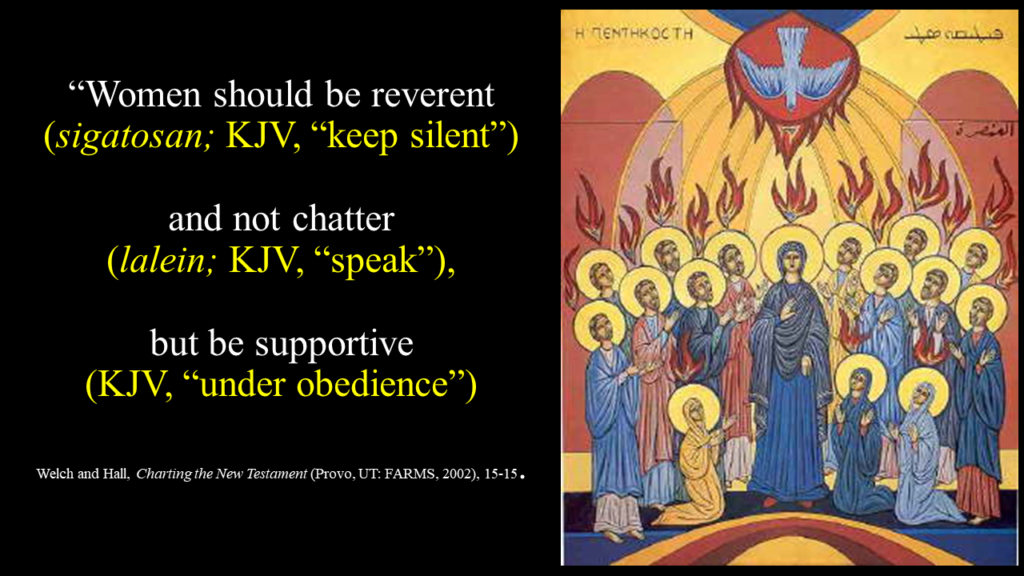
{Women should be reverent- (sigatosan; KJV “keep silent”) — and not chatter (lalein; KJV, “speak”) — but be supportive (KJV, “under obedience”) [Welch and Hall, Charting the New Testament (Provo, UT: FARMS, 2002), 15-15.]}
So the translation really makes a huge difference here. Silence is one of those three things. Subjugation, head, and silence. And it really has an enormous theological dependence on the translator as to how we’re looking at this. That’s one way of looking at it.
Joseph Smith said, that’s not the issue at all. They just got the word wrong. It’s not “speak” at all. It’s who has to rule. The whole thing is about authority.
[“…for it is not permitted unto them to rule in the church” (JST 1 Cor. 14:34-35).]
Which is very consistent, by the way, with the entire letter of 1 Corinthians. The majority of it deals with authority.
But the thing that I like on this: if you take out those two verses, the textual flow shows that those two verses are added later. And when you go back and you look at the—you know, there’s 2,500 documents that all are 1 Corinthians in the first 600 years of Christianity. We have a lot of early Greek texts on this matter– but when you go back to the earliest ones, in Ephesus, where John the Beloved is living, the earliest documents of 1 Corinthians do not contain these two verses. They are added only in the dispensation or the generation after the apostles are dead.
So I feel—the way I handle this verse, is I just throw it out the window. It fits very well with the Judaizers, which Paul is constantly saying the Judaizers are coming in and messing things up. Paul’s constantly talking about false teachers, even as early as 2 Thessalonians, which is the second oldest document we have in the New Testament. And the Gnostics are saying the same thing. So he is battling this over and over.
And I’ve got just a couple more minutes because I want to save time for questions. So I want to just really quickly jump on this one [1 Timothy 2:9-15] because it’s very similar. In 1 Timothy, which I already said was a debated text, whether or not Paul wrote it, but he refers to replacing worldliness and self-promotion with service.
And he wants the women in King James to be shamefacedness. But in other translations, I want you to be modest and discreet, or be a little bit quieter, we’re not used to hearing women’s voices in churches, could you please just tone it down a bit. And that, of course, is what my husband should quote to me all the time, but he doesn’t, luckily.
{1 Timothy 2:11-12 [KJV “Let the woman learn in silence with all subjection. But I suffer not a woman to teach, nor to usurp authority over the man, but to be in silence.”] [NEB “A woman must be a learner listening quietly and with due submission. But I do not allow a woman to teach or exercise authority over a man, but to remain quiet.”]}
And then he says something wonderful. He says, “Let the woman learn” (KJV).
Now this is radically different. There are 613 commandments in the Torah for man. There are 6 for women. And it was against the law to teach the woman the Torah. There are statements that say from the time of the New Testament, “He who teaches the daughter the law, the same teaches her lechery.” It was illegal in a pharisaic home to teach the women the law. And here he’s saying, we want the women to learn.
So, now let’s keep going. “…listening quietly, with due submission” (NEB translation) —what does submission mean? Cooperation, respect, let’s fall in line here, you’re a student, let’s not be the know-it-all. We want you to be respectful and cooperate here.
And then the tricky one, “I do not allow women to teach or exercise authority over a man, but to remain quiet” (NEB translation).

So, I can’t answer all the questions, but, some of them: Did the author really mean this? And was this a specific problem? And how does it work in the restoration? I feel that the answer, though, is in verse 15, to this:
“Adam was not deceived, but the woman being deceived…” and he goes on and says, in most translations, that the way that we’re saved is if we could just have children. Women could be saved if they’d just bear children. [“…will be preserved through the bearing of children if they continue in faith and love and sanctity with self restraint” (NASB translation).]
But Joseph changes it. Not that the women could be saved, but that the husband and the wife can be saved.
[“she shall be saved in childbearing, if…” (KJV); “they shall be saved in childbearing, if…” (JST)]
Which is exactly what Elder Ballard said when he said, just as a husband and wife are needed to create a child, so it is in the priesthood, in the highest order we have to have a husband and wife working together to hold the priesthood in its fullest. General Conference 2010 or something. This is the same idea, I feel, that Joseph changed.
But my favorite idea comes from this translation: “Even though she [woman] will be saved [not from child labor, not from labor and delivery] through the birth of the Child, if they continue in faith, love, and holiness, along with good judgment” (1 Timothy 2:15, ISV).
We are not saved by childbearing, we are saved through Jesus Christ.
And the apostolic church should be consistent with the restored church in saying that we are teaching what Christ taught. We don’t need to go back to Joseph Smith. It wasn’t Joseph’s church. It wasn’t Brigham’s church. It’s not President Nelson’s church. We belong to The Church of Jesus Christ of Latter-day Saints.
And it wasn’t Peter’s church, it wasn’t Paul’s church. They were doing their best to follow the Savior. And I pray we can do the same. In the name of our Savior, amen.
[No questions were taken due to a special presentation.]
